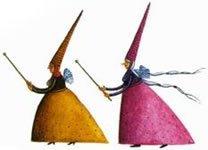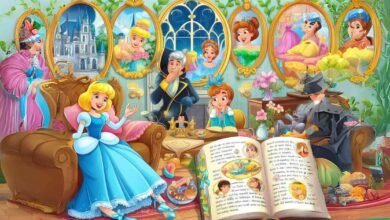The rain princess

When Princess Princelinda was born, the fairies had long been estranged from the Kingdom of the Reinets, where King Reinaldo reigned.
But since Queen Regina was very conservative and wanted to force her daughter to be fated by three fairies, she had an ad placed in every newspaper in the kingdom. 3 Fairies are needed. It pays well. Response to the Royal Palace.
As if by charm, after three days, three fairies performed. They wore satin dresses with painted stars, pointed hats, and the indispensable magic wands.
A shiver of wonder, disbelief, and joy shook the palace.
The gatekeepers opened their doors wide, the ministers, called in haste, began to discuss the application of fairies to state affairs. The ladies dreamed of beauty creams made by fairies. The maids believed they still had Cinderella’s destiny.
Only the dogs did not seem enthusiastic about this intrusion of the supernatural and growled in despair that they could not throw themselves at their shins.
As the queen entered the overcrowded ballroom with the little princess in her arms, the three fairies approached.
“Here we are to fate your daughter,” said the oldest, whose voice was hoarse and her hair all white.
“Fairy, fairy, fairy ladies, for without fairy the life of kings is very difficult,” sighed the monarch.
“Even worse is the vassals,” muttered the court potter, who was soon pushed into the corridor.
“I will make you, princess,” said the first fairy, “so that you may be as good as there ever was another princess in the world.”
The second fairy, who had thick tortoiseshell glasses, leaned over the girl, kissed her pink cheeks, uttered the magic words.
“I make you so beautiful that there has never been another princess in the world.”
The queen was beaming as the third, slightly hunchbacked fairy reclined on the sofa.
“To have the strength to fate the princess, I need a good lunch first.”
Orders flew to the kitchen; pots and pans and pans flew to the stove; soups, chickens, chorizos, eggs, sweets, fruits, bottles flew to the large table where, in front of three golden plates, the fairies waited. And if they waited well, they ate better, as if starving them from the time the fairies walked the world without having to be called for announcements.
No sooner had the fairies wiped their lips on their napkins and widened the tight belts of their star-mottled dresses, the nurse asked respectfully:
– Can I go get the little princess?
The fairies looked at each other and, in chorus, answered all three:
– If there’s time to fade, there’s time to pay.
“You will have a royal payment,” said the king.
“For me,” said the first, “I want your golden coach drawn by ten horses.”
– How do I go for a walk on Sunday with family? It’s my best coach … my best horses … but word of king doesn’t go back!
“Yes,” said the second fairy, “I just want the queen’s jewelry.”
– And how am I going to introduce myself? Have you ever seen a queen without jewelry?
However, word of queen does not go back!
“Yes,” said the third fairy, “I am content with money from the state coffers.”
– How do I make roads? Shouted the Transport Minister.
– What about me schools? Cried the one from Education.
– Who will make hospitals, pay doctors and medicine without money? Asked the Health.
– An army doesn’t live on air. It takes money to buy shotguns, gunpowder, cannons. I defend the money from the bullet vaults! Cried the war minister.
“Can’t you make a discount, fairy lady?” Asked the finance minister. – It’s just that the country is in a crisis …
“A fairy makes no allowance,” said the third fairy relentlessly.
– You could accept payment in installments …
“Just ready, or not the princess!” So the prime minister came up with an idea:
“And if the princess were only doomed by two fairies … it’s not bad at the present time.” It will be good and it will be beautiful. What more does she need?
“The sons of the people have never been doomed and are stiffer than the sons of kings,” observed the court fly swatter.
The servants chuckled.
Then the queen ripped the little princess out of the nurse’s arms and extended her to the fairy.
– This is a monarchy. We are the boss. I want the princess doomed by three fairies.
There was a silence of ice.
The fairy took the girl, and when her lips were parted and her wand was resting on the child’s forehead, there was a strange noise of falling water. It was the princess peeing.
The fairy’s blue dress dripped, her wrinkled hands dripping like a tree after the rain.
A laugh of derision and hatred then crossed the fairy’s face.
“I fate you,” she shouted, “to be the Rain Princess, so that it always rains wherever you are.”
And soon the rain began to hit the windowpanes.
The queen collapsed unconsciously on a jug.
The Justice Minister beheaded her nurse for the crime of not putting princess Princelinda in plastic pants.
Amid weeping, wailing, sobbing, the king had the ten horses coupled to his golden carriage. There followed the ivory vault with the queen’s jewels, then followed the iron coffers with state money, behind the fairies, with the wands under her arm, an old woman, another pigeon, another hunchback.
And the coach drove off the road between the muffled fear of the people and the angry barking of the dogs.
The days, the months, the years went by.
The princess had grown in beauty and kindness.
The king had stopped going out because he had no coach.
The queen had left the room because she had no jewelry.
The kingdom had no roads, schools, hospitals, army because it had no money.
Over the persistent capital the rain fell, fell, fell. The streets had turned into rivers, the squares into lakes. The houses were now built on piles. The gardeners planted water lilies. The nobles, instead of hunting, fished from the windows. The shepherds kept flocks of ducks, and at the palace gates, instead of dogs, were guarding geese.
“All because of some plastic pants,” the queen whined.
– All for your old-fashioned fairy craze! – amended the king.
“All because of an ill-fated princess!” Roared the people, so loudly and so loudly, that his voice reached the highest tower of the highest palace, built on the highest columns where the princess lived.
“If I am the cause of all the evil in this land, it is best to change me,” the princess acknowledged.
When they all slept, foot by foot, he went to fetch his raincoat, his umbrella, his rain boots, and, under cover of the night, fled in a boat.
The next day a radiant sun hung over the city.
The brass bands played dance music, the boys came to swim in a bathing suit, the women spread their clothes to the window.
When the king and queen woke up at lunchtime, they were dazzled by such light. They rushed to her daughter’s room to show her the sun she had never seen before, but they came across the empty room.
They sent for her everywhere, under the bed, behind the curtains, in the huge halls, in the storerooms, in every corner of the city. Nothing!
He had surely fallen into the street and drowned!
After seven days national mourning was decreed.
Only the princess hadn’t died. He knew the maps of the great deserts of the Kingdom of the Reinets, which camels costly to cross.
“That’s where I was missing” – she thought many times …
It entered a caravan and soon a rain road was watering the sand.
In each oasis where he stayed overnight, wells were filled, cisterns overflowed, palm trees glittered.
The crested fields she stepped on became green meadows.
The fountains sang, the streams sprang from the stones, the rivers filled the beds.
The cornflowers rippled, the fruit bent the branches, the roses bloomed.
Three years the princess ran the country, until there was no village, village or place where her rain procession did not arrive.
One day, stopping to rest at the gates of the capital, he heard a roar of firemen, carts carrying water, boys shouting.
– The palace is on fire! The city is on fire!
The princess did not hesitate a moment. He jumped onto a hay-eating horse tied to a post and galloped through the bridle. Behind her the rain began to lash the earth.
Around the palace and all over the city galloped and rain poured down on it. She had lost her raincoat, her hair streamed down her back, her dress clung to her body under the whip of the storm.
We were stunned, bucket in hand, before this strangely beautiful girl.
Who was it, where did it come from, because the rain was galloping behind her?
Only when the last coil of smoke faded did he dismount from the panting horse.
Then he looked around for a long time. New houses were rising, grounded, cobbled streets had sprung up in place of rivers, squares with trees and dahlias where water lilies opened before water flowers. The dogs had returned to guard the palace and were licking their hands in joyful acknowledgment.
A new royal coach gleamed in the open carriage house, the state coffers piled up, and the queen loomed at the window, laden with stones.
– Princelinda, my daughter! She murmured, waving in amazement. – Princelinda!
The princess climbed the stone staircase, walked the corridors to the scorched throne room.
“You’re going to get pneumonia, you’re soaking wet,” said the king, kissing her. – You better change your clothes.
“I never get cold, I’m so used to it. Have you forgotten I’m the Rain Princess?”
“Really …” sighed her mother, thinking that she had recovered her daughter but lost the sun again.
Princelinda then told how she had walked from land to land, with the rain in tow, over hills and valleys, mountains and deserts, pulling her where she needed to be.
“Instead of cursing, it was a gift the fairy bestowed upon me, after all, by making me Rain Princess.”
– It’s fantastic! Acknowledged the prime minister.
“That is the only explanation for the agricultural overproduction of our kingdom,” said the minister of agriculture.
– The fires will be put out in no time! Exclaimed the fire chief, rubbing his hands together.
“We can rent it to our allies in case of drought,” added the Foreign Minister.
“Well, I propose,” said the sculptor Phidias Filete at last, “a statue representing the fairies, the princess, and the nurse who did not put on her plastic pants.” Poor thing, may the earth be light to you …
The statue was carved and for its inauguration the queen had again placed an advertisement in all the newspapers. Fairies are invited to the grand opening day 3 at 3 o’clock in front of the Royal Palace.
But no fairy presented herself.
As the princess would naturally be present, no one came without an umbrella. In fact, a light rain fell throughout the ceremony, giving the polished marble a beautiful shine.
As soon as the session was over, the princess said goodbye to her parents.
“I leave now, at five, to the north, the day after tomorrow I go down the sea coast, for the following week I go inland.” My program is announced in the weather report. Do not forget to write me.
– Modern girls are so independent … Always on the go! Noted the king.
“It’s going to be a problem getting you a fiancé, who doesn’t mind ever walking in the rain …” her mother whined.
And they were tenderly gazing at the dark clouds that drifted across the sky, dripping on the carriage. Luísa Ducla Soaraes The Rain Princess Porto, Civilization Publishing House, 2007



